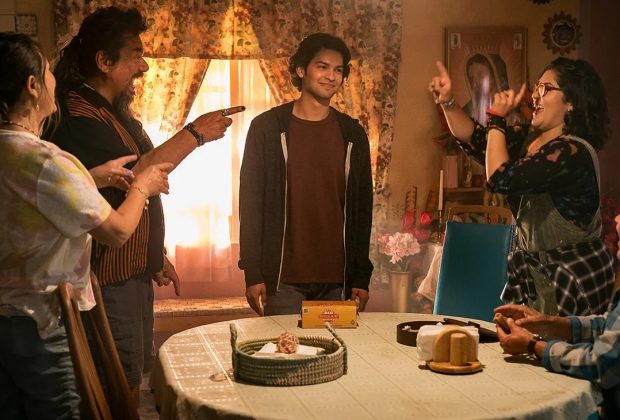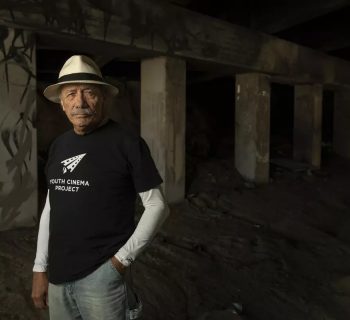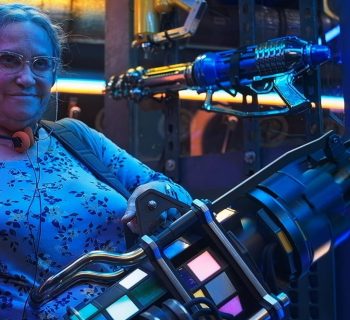With its stars sidelined due to the strike, a coalition of advocacy groups are finding ways to promote the DC film.
By Aaron Couch, Rebecca Sun & Borys Kit | The Hollywood Reporter | AUG. 16, 2023 | Photo courtesy of Warner Bros.
Two years ago, Xolo Maridueña made a surprise appearance on the red carpet of Warner Bros.’ DC feature The Suicide Squad. It was a coming-out party of sorts, as the night before, at a surprise dinner thrown by DC executives, the Cobra Kai actor learned he had nabbed his biggest role yet: starring as the title character in the action-adventure feature Blue Beetle. “It feels like a fairy tale,” an ecstatic Maridueña told The Hollywood Reporter at the time.
Now, as Blue Beetle arrives in theaters Aug. 18, the actor won’t be walking a red carpet premiere for the film, the first studio movie to center on a Latino superhero. Not because Maridueña doesn’t want to but because there is no premiere, red carpet or blue, for the movie.
Blue Beetle is the first major live-action release to bow since the actors strike began July 14 that did not have a press tour banked ahead of time. The movie would ordinarily be getting a full publicity push, with its cast — including George Lopez, Bruna Marquezine and Harvey Guillén — making stops at San Diego Comic-Con and speaking about the significance of this film.
“It’s heartbreaking,” director Angel Manuel Soto says of his cast not being able to promote the film. “This is their moment. We’ve never had a [studio superhero movie] that celebrates our culture, with characters who look like my family and many other families out there. So it’s a shame they cannot have the spotlight that they deserve.”
Blue Beetle arrives after a series of ill-fated movies featuring Latino representation. Last year, Warner Bros. Discovery unceremoniously shelved Batgirl, starring Dominican American actress Leslie Grace, as a tax write-down. A year before, the musical In The Heights failed to ignite audiences in a way studio Warner Bros. had hoped, with accusations of colorism leveled at the studio.
Hopes for the movie were high for the Latino community. The film was originally developed for HBO Max with a budget in the $70 million range before being supersized into a theatrical release and greenlighted with a budget of about $120 million. Alongside the Eva Longoria-directed Hulu hit Flamin’ Hot and A24’s Problemista (since delayed amid the strike), Latino representation looked to be on the upswing. “We were hopeful that our long overdue cultural moment had finally arrived,” wrote 27 Latino advocacy groups in a joint open letter published Aug. 9, urging the public to support Latino creatives.
Latinos, who make up 19 percent of the U.S. population, over-index in terms of filmgoing, buying 29 percent of tickets sold in 2020, according to a Motion Picture Association study. Yet they are underrepresented onscreen. In 2022, they represented 5.1 percent of lead roles in films and 4.5 percent of co-leads in ensemble films, according to a 2023 study by the Latino Donor Collaborative.
Diana Luna, executive director of the National Association of Latino Independent Producers, tells THR that multiple nonprofits are planning on buying out theaters for community members and schoolchildren.
Still, observers worry the film, which is tracking for a $30 million opening, will not get the cultural moment afforded to projects such as Marvel’s Black Panther or Shang-Chi and the Legend of the Ten Rings. Multiple sources in the inclusion space expressed fear that it could lead to fewer such projects getting made.
“If the project doesn’t do well, a year from now it’s not going to be like, ‘It was because of the strike.’ It’s going to be, ‘No, it just didn’t do well and it’s because it was BIPOC, so we tried that,’ ” Michelle Sugihara, executive director of the Coalition of Asian Pacifics in Entertainment, says of BIPOC-led projects released during the strikes.
That focus puts an undue burden on the movie. Says Ana-Christina Ramón, who sits on the Latino Film Institute board and was the lead author of the UCLA Hollywood Diversity Report: “No one film should have to shoulder all the responsibility for Latinx representation in Hollywood. But its success can be the undeniable example that investment in Latinx creatives pays off.”
The Hollywood labor walkouts have caused Warners to pivot to a more grassroots campaign. Screenings have taken place in more heavily Latino-populated cities such as Miami, Los Angeles, San Antonio and Austin, plus Chicago and New York, with Soto crisscrossing the continent and acting as the film’s ambassador. And the studio has engaged organizations on the street level to drum up interest. “Warners is doing the best it can,” says a Blue Beetle insider.
The film is even getting a boost from beyond the Latino community. The AAPI-focused Gold House, which helped drive opening-weekend turnout for films such as Crazy Rich Asians, has turned its attention to Blue Beetle, promoting it on its social accounts. Executive director Jeremy Tran notes that organizations working together can in a small way fill the gap without actors promoting the movie. “We’re going to say what the artists can’t say and encourage everyone to come out and support,” says Tran.
Maridueña, seen in Hollywood as someone who could have a Tom Holland- or Timothée Chalamet-like career, is said to be conflicted and frustrated, according to insiders. “It’s a big moment for the culture, and to not be able to shout it from the rooftops, that’s tough,” says a source close to the actor. But regardless of how well Blue Beetle does, it likely won’t be the last audiences see of his character. As opposed to some heroes from movies made by the previous Warners regime, James Gunn has said Blue Beetle will continue in the rebooted universe he’s developing with DC Studios co-head Peter Safran.
On July 13, a day before the strike launched, Maridueña shared his support for SAG-AFTRA in a video while also appealing to fans to spread the word on the film: “I won’t be able to promote this movie, but you can.”







